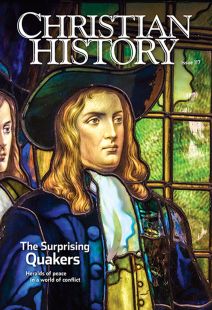Quaker Speak
Order Christian History #117: The Surprising Quakers in print.
Subscribe now to get future print issues in your mailbox (donation requested but not required).
Friends
Friend: A Quaker
Birthright Friend: Originally, a person whose membership came from being born to Quaker parents; today, common shorthand for a lifelong Friend
Convinced Friend: A convert to Quakerism
Meetings
Clerk: The person who presides over a meeting for business
Discipline: The collection of rules and advice by which Friends are expected to govern their lives and conduct business, now often called “books of Faith and Practice”
Meeting: A Quaker congregation or gathering
Meeting for Business: A meeting to transact congregational business in a spirit of worship and discernment
Sense of the Meeting: A shared understanding of the will of God on a particular matter in a meeting for business
Yearly Meeting: Historically, the highest level of Quaker authority
The Life of Faith
Inner Light or Inward Light: The Light of Christ inwardly revealed in lives of believers, seen today by liberal Friends as a universal divine spirit
Leading: An insight or action based on divine guidance
Queries: Originally a set of questions that meetings answered to report how truth fared among them; generally used as guides for personal spiritual growth and evaluation.
Spirit: For most Friends the Holy Spirit; for some, a universal principle of goodness
Testimony: A principle for Quaker conduct and life
Weight: Spiritual influence and wisdom, as in “weighty Friend”
Divisions (see p.23 for more)
Hicksites: This group emerged from the first major Quaker division (1827–1828). Followers of Elias Hicks, they opposed what they saw as Orthodox Quaker innovations and authoritarian leadership.
Orthodox: The larger group to emerge from the 1827–1828 schism, they opposed what they saw as the unsound ministry of Hicks and his stress on the Inner Light.
Gurneyites: The largest group to emerge from Orthodox Quaker schisms of the 1840s, they followed the teachings of John Joseph Gurney. They held beliefs congruent with evangelical Protestants on the divinity of Christ and the authority of Scripture.
Wilburites: These Orthodox Friends opposed the ministry of Gurney and are today known as Conservative Friends.
Worship
Programmed: Worship with a predetermined schedule, usually including a sermon, hymns, and prayers led by a pastor
Unprogrammed: Worship based on silent waiting for leadings from God, rather than the expectation that any one person will speak or lead.
This article is from Christian History magazine #117 The Surprising Quakers. Read it in context here!
By Thomas D. Hamm
[Christian History originally published this article in Christian History Issue #117 in 2016]
Thomas D. Hamm, professor of history, director of special collections, and curator of the Quaker Collection at Earlham CollegeNext articles
All who believed in God were welcome
William Penn’s idealistic creation of Pennsylvania
J. William FrostChristian History Timeline: The Surprising Quakers
Quakers in Britain and the United States have been in the middle of social ferment for many years
Thomas Hamm and the editors




